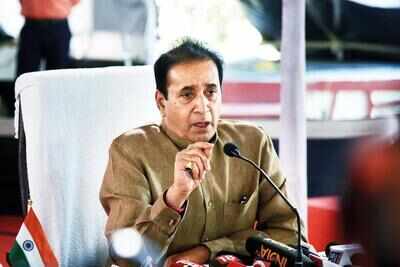Top Searches
- News
- City News
- mumbai News
- Anil Deshmukh’s lawyer says even Kasab got benefit of rule of law
Anil Deshmukh’s lawyer says even Kasab got benefit of rule of law

Anil Deshmukh
MUMBAI: The Central Bureau of Investigation (CBI), in registering a corruption case FIR, had not followed the legal provisions of seeking the state’s consent and prior sanction, said counsel for former home minister Anil Deshmukh on Friday before the Bombay high court. Senior counsel Amit Desai for Deshmukh said, “Even a person like (Ajmal) Kasab got the benefit of rule of law in this country.”
“If we bypass procedure, then we have a challenge of the rule of law,” said Desai, while arguing Deshmukh’s quashing petition.
Desai was making his submissions before a bench of Justices S S Shinde and N J Jamadar. He focused on the necessity to ensure principles and procedures of law are not given a go-by. The HC had directed that post its preliminary enquiry in the complaint by advocate Jaishri Patil, based on ex-police chief Param Bir Singh’s letter, the CBI should take steps “in accordance with law.” Desai said this would mean applying for the government’s consent under Section 6 of the Delhi Special Police Establishment Act and for prior sanction as mandated by Section 17-A of the Prevention of Corruption Act (PCA).
The April 21 FIR does not even mention commission of any “substantive offence” and merely says that he “attempts” to take undue advantage and the FIR has thus invoked Section 7 of Prevention of Corruption Act that deals with public servants taking gratification other than legal remuneration in respect of an official act, Desai said.
The FIR says the reinstatement of Sachin Waze as an API was done after his 15-year suspension, and important or sensational cases were entrusted to him and Deshmukh had “knowledge” of it. “Knowledge” in law does not amount to offence, Desai argued. “No judgment of any court can be read or interpreted in a manner that nullifies the express provisions of an Act,” he submitted, citing SC judgments. He said, “Every allegation does not mean corruption. Every allegation if suo motu taken for a probe, there will be a collapse of the system…there will be anarchy.” “We have forgotten the legal doctrine of presumption of honesty when discharging public duty. We have attuned ourselves to believe in presumption of dishonesty…Your lordships are the filter to protect the society.”
The HC bench said, “Laws have to operate in society, not in a vacuum. Law is a process of social engineering.”
Citing an SC order, Desai said CBI probe “should be passed only when HC, after considering material on record, comes to a conclusion that it does disclose a prima facie case calling for such investigation.” In this case, he said the HC had no material before it. Nothing prevented CBI from seeking the state’s consent, as was done in a case before Guahati high court. The arguments will continue on Monday.
“If we bypass procedure, then we have a challenge of the rule of law,” said Desai, while arguing Deshmukh’s quashing petition.
Desai was making his submissions before a bench of Justices S S Shinde and N J Jamadar. He focused on the necessity to ensure principles and procedures of law are not given a go-by. The HC had directed that post its preliminary enquiry in the complaint by advocate Jaishri Patil, based on ex-police chief Param Bir Singh’s letter, the CBI should take steps “in accordance with law.” Desai said this would mean applying for the government’s consent under Section 6 of the Delhi Special Police Establishment Act and for prior sanction as mandated by Section 17-A of the Prevention of Corruption Act (PCA).
The April 21 FIR does not even mention commission of any “substantive offence” and merely says that he “attempts” to take undue advantage and the FIR has thus invoked Section 7 of Prevention of Corruption Act that deals with public servants taking gratification other than legal remuneration in respect of an official act, Desai said.
The FIR says the reinstatement of Sachin Waze as an API was done after his 15-year suspension, and important or sensational cases were entrusted to him and Deshmukh had “knowledge” of it. “Knowledge” in law does not amount to offence, Desai argued. “No judgment of any court can be read or interpreted in a manner that nullifies the express provisions of an Act,” he submitted, citing SC judgments. He said, “Every allegation does not mean corruption. Every allegation if suo motu taken for a probe, there will be a collapse of the system…there will be anarchy.” “We have forgotten the legal doctrine of presumption of honesty when discharging public duty. We have attuned ourselves to believe in presumption of dishonesty…Your lordships are the filter to protect the society.”
The HC bench said, “Laws have to operate in society, not in a vacuum. Law is a process of social engineering.”
Citing an SC order, Desai said CBI probe “should be passed only when HC, after considering material on record, comes to a conclusion that it does disclose a prima facie case calling for such investigation.” In this case, he said the HC had no material before it. Nothing prevented CBI from seeking the state’s consent, as was done in a case before Guahati high court. The arguments will continue on Monday.
FacebookTwitterLinkedinEMail
Start a Conversation
end of article
